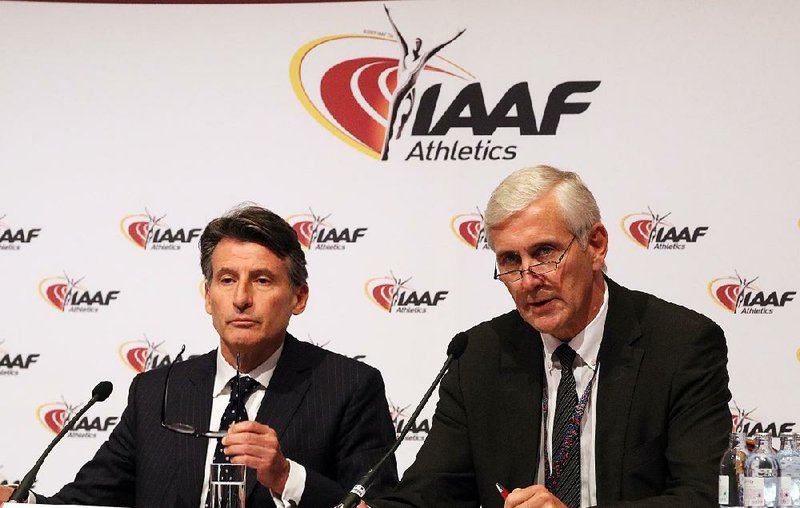VIENNA -- Russia's track and field athletes will be banned from competing for their country at the Rio de Janeiro Olympics after a decision Friday that punished the sports powerhouse for a doping system that operated "from the top down."
In an unprecedented ruling, the International Association of Athletics Federations upheld its ban on Russia's track and field federation, saying the country had made some progress in cleaning up but failed to meet the requirements for reinstatement and would be barred from sending its athletes to the Rio Games, which begin in 50 days.
"Russian athletes could not credibly return to international competition without undermining the confidence of their competitors and the public," IAAF President Sebastian Coe said.
Russia condemned the decision, saying it was "deeply disappointed" and that the Rio Games will be "diminished" by the absence of its athletes. The Russian track federation said it was considering an appeal to the Court of Arbitration for Sport -- the sports world's highest court.
The IAAF, track's world governing body, left open a "tiny crack" that would allow individual Russian athletes who have been untainted by doping and have been subjected to effective testing outside Russia to apply to compete in the games.
However, the IAAF said those athletes would be few and would be eligible to compete only as "individuals" -- not under the Russian flag.
"The crack in the door is quite narrow, and there won't be many who manage to get through that crack in the door," said Rune Andersen, the Norwegian anti-doping expert who headed the IAAF task force that determined Russia's attempt to cleanup its program was not enough.
The IAAF said it was necessary to ban the entire track and field team because there was no way to verify which athletes could be considered clean.
"The system in Russia has been tainted by doping from the top-level down," Andersen said. "We cannot trust that what people might call clean athletes are really clean. If you have one or two or five with negative tests, it does not mean the athletes are clean. History has shown that is not the case."
Coe dismissed suggestions there were political motivations behind the decision.
"There were members from all four corners of the world, and the decision was unanimous," he said. "Politics did not play a part today."
The ruling came four days before a sports summit called by the International Olympic Committee to address "the difficult decision between collective responsibility and individual justice."
The IOC said it had "taken note" of the IAAF ruling, and its executive board will meet by teleconference today to "discuss the appropriate next steps."
There has been speculation the IOC could overrule the IAAF or impose a compromise that would allow "clean" Russian athletes to compete. However, Coe made clear that the IAAF runs the sport and determines which athletes are eligible, not the IOC.
"I don't have a message for the IOC," said Coe, who will attend Tuesday's meeting in Lausanne, Switzerland. "Eligibility is a matter for the IAAF."
The suspension of the Russian federation, known as RusAF, was imposed in November after a report by a World Anti-Doping Agency commission that alleged state-sponsored cheating, corruption and cover-ups. On Wednesday, WADA issued a new report citing continuing obstruction and violations of drug-testing in Russia.
"The deep-seated culture of tolerance, or worse, for doping that led RusAF being suspended in the first appears not to have changed materially to date," the IAAF said.
Coe said the unanimous decision by the 25 members of the IAAF council to maintain the ban sends "a very clear signal to athletes and the public about our intention to reform our sport."
"It gives a measure of hope to clean athletes that there are consequences not only for athletes who dope, but for countries which do not engage seriously in the fight against doping," U.S. Olympic Committee CEO Scott Blackmun said. "That is a much-needed message."
Sports on 06/18/2016

